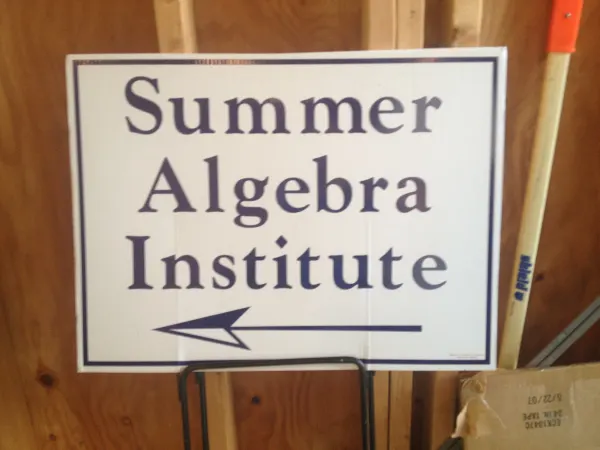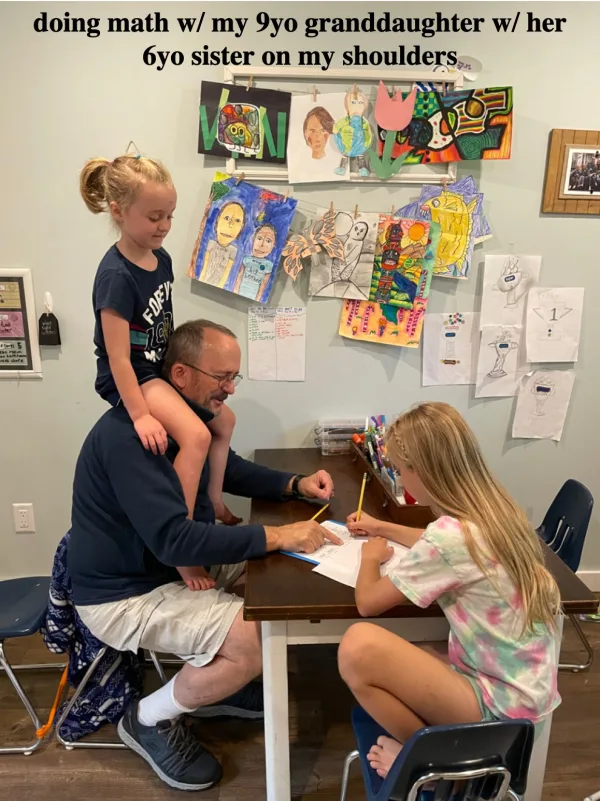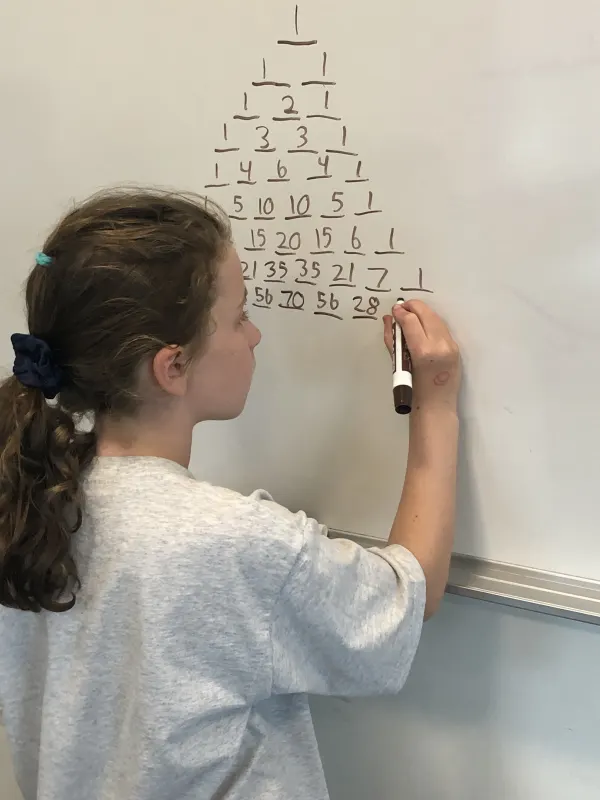Algebra For Kids, LLC
About
• I teach kids how to "think mathematically" with simple, brief, kid-friendly, classroom-tested principles that WORK - from fractions, problem solving, basic facts, place value, & percent, to foundational algebra principles such as variables, powers, equations, and number properties.
• These practical principles help students at every level see how math is a connected, unified field of study - that how we work with algebra and variables is very similar to how we work with fractions and place value. It's a sheer DELIGHT using these principles to help "the light go on" for students.
• In my 30+ years of teaching and tutoring, I’ve earned a reputation for teaching effective ways to remember and master new material.
• For example, for parents, teachers, and administrators to whom I’ve shown the First Name, Last Name (FNLN) principle, every single one of them has said something to the effect, “I wish I’d known that when I was in grade school.”
• The FNLN principle is one of THE most helpful things to know in elementary math, and nobody except me really teaches it. It helps set kids up for success down the road in almost every area of math, especially algebra - yet it also makes more sense out of place value, fractions, units of measurement, and many areas of science.
• The experience I've had teaching math at so many grade levels means that I know both where students are coming from in math and where they're going in math - and what causes confusion for students at any level.
• I've earned several degrees over my career:
- Masters in Math Education; the University of Minnesota
- Bachelors in Math Education; the University of Minnesota - Bachelors in Childhood Learning; Macalester College.
• For 27 years, I taught secondary math in the St. Paul (MN) area, the Alg.1-Alg.2-Precalculus sequence of math courses.
• But one aspect of my career that I'm most satisified with is that both of our sons learned to be really, really good at math and have superior skills to this day in mental math and "number sense."
• My wife and I also own and operate a math enrichment program called SAI: the Summer Algebra Institute for Kids (grades 3-8) In SAI, we have taught substantive algebra to some 4,000 kids as young as 3rd grade since our founding in 1995 - teaching algebra in ways that connect with basic facts, place value, fractions, and problem solving. Check our website at www.AlgebraForKids.com.
• I love seeing the light go on in the eyes of students when they "get it."
• I love seeing uncertainty turn to confidence.
• I love teaching, I love learning, I love math, I love kids.
Highlights
Payment methods
Specialties
Grade level
Type of math
Photos and videos






Reviews
Chris M.
Becky M.
Rob G.
Kristen H.
Michelle C.
Rob G.
Frequently asked questions
What is your typical process for working with a new student?
My basic approach always follows the old proverb: GIVE someone a fish and you feed for a meal. Teach someone HOW to fish and you feed for a lifetime. Usually, students need more than just one fish - they need to learn how to fish. So...
• First, I pinpoint where students are having difficulty.
• Next, I then dig further into the difficulty with gentle but probing questions - "Tell me, what is the problem asking for?" - or "Okay, what IS the meaning of ___ (division, or place value, or a fraction, or "function")?" or "Good - what's the first thing to do with a word problem?"
• Then, I determine if the issue is just this one particular problem - or if there is something bigger behind the problem: Do they understand what a fraction is? Do they know what a particular word means? Do they know that there really is a FIRST thing to do with every word problem? Do they know how a function is different from a relation?
• Then I help them get students from where they are to where they want to be. Sometimes they need help wih just clarifying how to do a procedure. Sometimes they just "don't get" the idea of fractions (or what division really means; or what a variable is; etc.). Sometimes they need to memorize something (and I teach kids HOW to memorize and what the three key elements of memorization are!!!).
What education and/or training do you have that relates to your work?
• For 30+ years I've taught math at every level from 1st grade thru high school - I know what's ahead down the mathematical road!
• Since 1995, I've run my own summer math enrichment camp - some 4,000 students have attended.
• The math principles I teach are practical, sensible, kid-friendly, and classroom-tested - they make sense out of ALL areas of math.
• For several years, I also worked as a math tutor with Hotline 4 Homework (H4H). At H4H, I tutored students OVER THE PHONE with their math (from early elementary through high school), so I also have learned effective ways of doing "distance-tutoring" by phone.
• My formal education includes:
- M.A. in Math Education; the University of Minnesota
- B.S. in Math Education; the University of Minnesota
- B.A. in Childhood Learning; Macalester College.
Do you have a standard pricing system for your lessons? If so, please share the details here.
My pricing is flexible. Many times, students who work with me need LESS time overall, because I teach practical principles that connect math across topics and across grades.
• If you like what you're reading here, then contact me and we'll work something out!
How did you get started teaching?
Several things came together to direct me into teaching:
• I'd worked in business after college for several years, which helped me realize that I'd always wanted to be a teacher.
• The 1982 Oscar-winning movie "Chariots of Fire" - about the 1924 Olympic sprinter Eric Liddell - helped me realize that I was made to be a teacher.
• My wife told me one day, "Only a few things make your eyes light up - one of them is math..."
... So I decided to become a teacher. And I've loved it! - I love math, I love learning, I love teaching, I love kids.
What types of students have you worked with?
I've worked with every grade level from 1st grade through high school, in three main situations:
1. teaching middle school & high school math for 27 years
2. running my own math enrichment program since 1995, called SAI: the Summer Algebra institute for Kids. In SAI, we've taught substantive algebra to some 4,000 kids in grades 2-7 since 1995
3. I also was project director of the Chelsea Math Initiative, a pilot program in which we used algebra, calculus, music, and manipulatives to teach First Grade math to regular students in a traditional school setting.
Describe a recent event you are fond of.
• Doing almost anything with my two adult sons is great.
• My younger son and I love paddleboarding on local lakes.
• Recenlty, I helped my older son lay a new coat of blacktop on his driveway, and later we used our chainsaws to cut up a fallen tree on his property.
• In June, my sons and I spent an hour hitting flyballs and playing catch on Father's Day.
• I also love showing math stuff to my 8yo granddaughter - she loves learning some of "the cool math stuff Grandpa shows me."
• My wife and I love reading aloud to each other at night - we've been doing that since very early in our marriage and have read some great books over the years.
What advice would you give a student looking to hire a teacher in your area of expertise?
My advice: look for MORE than someone who just knows the math - find someone who's passionate about math - who gets excited about it, who's had experience sharing that enthusiasm with students.
What questions should students think through before talking to teachers about their needs?
• Ask questions like "What areas of math have you taught before?" or "Tell me how familiar you are with the specific topic I need help with."
• Ask these kinds of questions because You DON'T want a teacher with just a passing famiiarity with what you have questions about - you want a teacher who really knows that subject area and the specific topic or topics that you're working on.
• Listen for the teacher to actually ANSWER the questions you're asking (as opposed to replying with a question for you!).
• Think as specifically as possible about the questions you have - THIS particular problem (page # and problem #); or THIS particular concept/definition (What is an exponent?); or THIS particular explanation (on page__ in your book). Before you meet with the teacher, have a note to yourself with the specific problems you want to cover (page numbers, problem numbers, etc.).